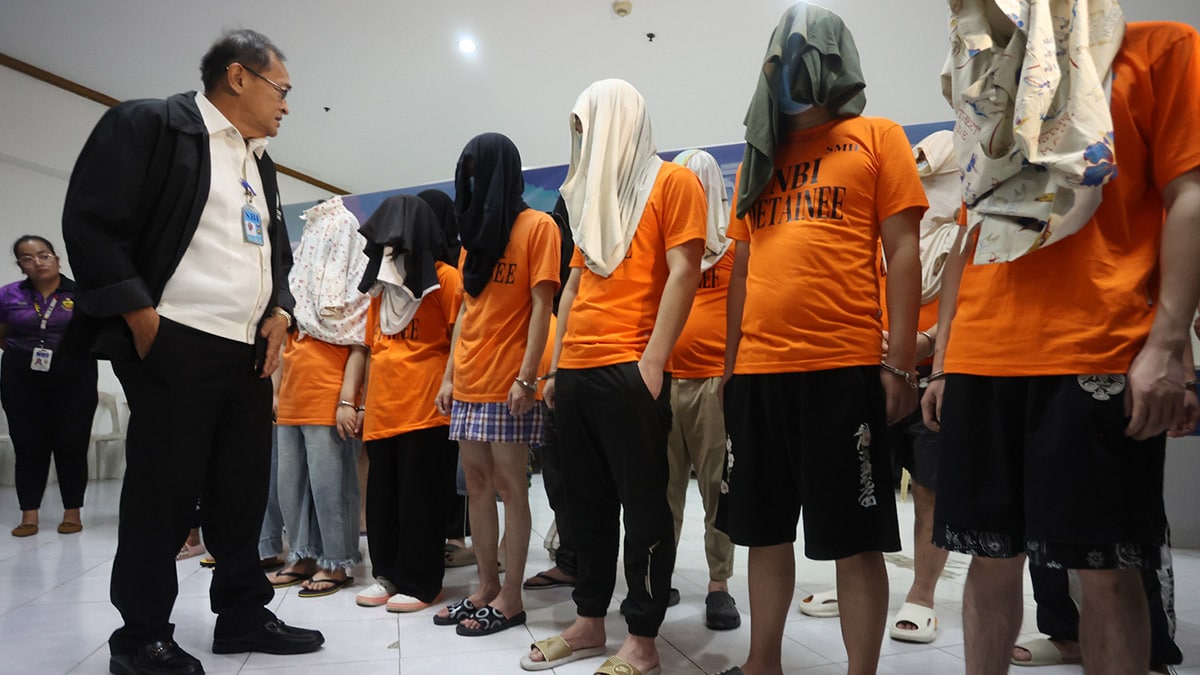PAOCC: Filipinos taking over scamming rings

ONLINE FRAUD National Bureau of Investigation Director Jaime Santiago on Tuesday talks to a group of 17 foreigners arrested during an operation conducted by the NBI Cybercrime Division in Makati City last week. The foreigners, 15 of them Chinese, are allegedly involved in online fraud and other scams. —Niño Jesus Orbeta
MANILA, Philippines — The government crackdown on illegal Philippine offshore gaming operators (Pogos) across the country has found out that some Filipinos have learned about the scamming schemes and taken over the activities left by their foreign operators, an official of the Presidential Anti-Organized Crime Commission (PAOCC) said on Tuesday.
For the remaining Chinese operators, the National Bureau of Investigation confirmed that they had broken up into smaller groups to avoid being detected by authorities.
“There are Filipinos who have been taking over some scamming operations, we are already seeing some of these, albeit a few small groups,” PAOCC spokesperson Winston John Casio said in an interview on state-run television.
READ: PAOCC says 100 Pogos still operating despite ban, vows crackdown
“That was something we have feared all along—that the time will come that Filipinos would become so adept with these Pogo activities that they will learn to take over the scamming operations from the Chinese,” Casio noted.
He made the statement just as the interagency task force on Pogo raided another suspected scamming hub in the city of Biñan in Laguna province on Tuesday.
Operatives, however, found dismantled computers at the New Wave Technologies facility said to be owned by Pogo “big boss” Lin Xunhan.
“Sadly, when we inspected the areas, all of the possible pieces of evidence had missing hard drives. This could mean that [records] of all their illegal activities have been disposed of,” he said.
Under the radar
The task force is racing against time to wipe out all Pogo activities in the country by the end of the year, in compliance with the ban announced by President Marcos during his State of the Nation Address in July.
“The biggest challenge for us now is that a large number of Pogo firms have gone underground. So, there are a good number of them and we’re having difficulty catching up,” Casio said.
He said that while the number of internet gaming licensees (IGLs)—the rebranded name of Pogos—was now down to 38 and were confirmed to have been winding down their operations, the task force continues to grapple with stopping the activities of “illegal” firms.
“We do not have a problem with the legal IGLs because they are complying with the requirement of the [Philippine Amusement and Gaming Corp.] and the President to really stop all of their operations by the end of the year,” he said.
Casio noted that the illegal ones were their main concern, or “those from the get-go have already been staging illicit, underground operations.”
The PAOCC estimated that about “50 to more than 100” illegal Pogo firms continue to operate in different locations in Luzon, the Visayas, and Mindanao, Casio said.
“What used to be the bigger Pogo hubs, with hundreds and thousands of employees, have disintegrated and were formed into smaller groups, which is why they multiplied in number,” he lamented.
Smaller units
NBI chief Jaime Santiago on Tuesday confirmed that Pogos were now operating in smaller groups to avoid detection.
He made the statement following the arrest of foreigners involved in a suspected Pogo activity in Makati City last week where 15 Chinese, a Malaysian, and a Taiwanese were caught red-handed engaging in online scamming activities.
Santiago said the 17 were likely part of a bigger Pogo operation but left to continue their scamming activities in a smaller group to avoid detection.
“Based on our observation, larger Pogos have [broken up] into smaller groups and are occupying residential units, apartments, in order to escape our notice,” he noted.
NBI Cybercrime Division chief Jeremy Lotoc said the group’s usual modus involved love scams victimizing mostly foreigners.
He explained that the suspects would hook victims through their love scams, before offering investment proposals such as crypto to get them to send money.
“In our initial investigation, those who were arrested were part of the communications group. They are the ones who entice and chat with victims,” NBI agent Terence Lomas-e said. “There is another group, which is remotely located, who receives the money.”
Having different departments for finance, communications, as well as for administrative tasks, is one of the strategies Pogos employs to continue their operations so that even when one department gets busted, the rest can continue to operate, said Lotoc.
Citizens’ help
Casio said the problem of Pogos could be solved only with the help of the community.
“The community is the eyes and ears of the government and our nation, so whenever our citizens see some of these illegal activities, we need their help to be able to report it to their LGUs (local government units) and to law enforcement agencies,” he noted.
“Whenever you see these types of suspicious activities which involve many foreign nationals who are not tourists, please report them immediately to your LGUs, the PAOCC, the [Philippine National Police] and the NBI,” he said.
He also warned owners of houses, apartments, condominium units, and other commercial facilities to practice “due diligence” in making sure that they are not renting out their property to scamming rings.
Meanwhile, the Bureau of Immigration (BI) said it would start looking for more than 12,000 alien Pogo workers, or around half of the total number of employed foreigners whose working visas expired on Oct. 15, who did not voluntarily downgrade their visas.
“According to our latest data, there are about 12,000 who have filed for voluntary downgrading. The count will stop [on Wednesday] but hopefully, this number submitting themselves for visa downgrading would still increase,” BI spokesperson Dana Sandoval said.